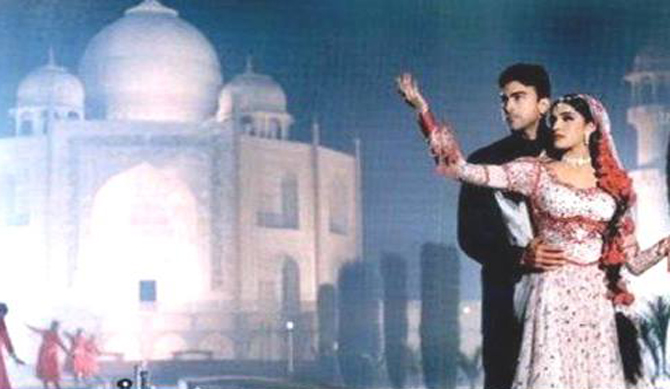Tere Pyar Mein (تیرے پیار میں), an Urdu film was released on 28th of December, back in 2000 on Eidul Fitr. Film was produced by Shahzad Gul under his family production company Evernew Pictures, founded by the late Agha G. A. Gul in the early days of the Pakistan film industry. Prior to Tere Pyar Mein, The studio saw grand success in another action flick, Ghar Kab Aao Gay in January 2000, thus the film fraternity and cine-goers were eagerly waiting for the next project from Shahzad Gul. Tere Pyar Mein (TPM) was launched with Hassan Askari as the director, and like GKAG, the main male lead of TPM was Shaan while the female lead was not announced.
Shahzad Gul also introduced a new trend with TPM when he hired the famous stylist Khawar Riaz. Back then there was no trend of hiring a professional stylist for films. Since the heroine of the film was not finalized, it led to much speculations in the media. The leading filmi shows in the electronic media hosted by Iffat Umar, Ayesha Sana and Farah Shah extensively covered the gossips surrounding the casting of female lead of the film. Noor was considered as the strong contender for the choice of heroine as she was alreary working with Shaan in his directorial project Mujhe Chaand Chahiye.
After much speculations finally Shahzad Gul introduced the heroine of TPM through a magazine show hosted by Ayesha Sana. Instead of casting any existing actress, Shahzad opted for a new face — the model Zara Sheikh. Zara Sheikh was introduced in the fashion industry by Khawar. Zara Sheikh’s inclusion was a breath of fresh air in the Urdu cinema which also gained interest of the cine goers. Suddenly the filmi press was buzzing with the introduction of Zara Sheikh. Apart from Zara Sheikh, Noor was also included in the cast of TPM for one dance number while Veena Malik had a supporting role.
Apart from the cast, Shahzad Gul again opted for Amjad Bobby as the music composer. And just like his previous GKAG, the vocals of all the songs were by Indian singer which were replaced by ghost singer names due to Indo Pak tensions at border.
Story wise TPM was a cross border romance between a Pakistani Muslim boy and Indian Sikh girl. As per the demand of the story a part of the film was to be shot in India. One song of the film was planned on Taj Mahal monument in Agra, India. As per the press reports Shahzad Gul applied for the permission of Indian government and visa for shooting in India. However the required permission was not granted and thus all the shooting was done in Pakistan.
For that particular song sequence, an expensive set of the Taj Mahal was prepared. It was erected in Bagh-e-Jinnah Lahore and the whole song was shot as per the plan. Song was choreographed by HSY on Shaan, Zara and a bunch of back dancers. The choreography, the wardrobe, the styling and final execution of the song was all on point. The erection of the set for this song also created quite a buzz in the media again. It also led to an interesting incident that once the shooting of the song was completed, the government authorities did not allow to remove the set of the Taj Mahal from Bagh-e-Jinnah and it remained there for few months.
TPM was finally screened on EidulFitr and it proved an instant hit. The audience whole heartedly welcomed the new face of Zara Sheikh paired with the superstar Shaan. The film proved successful in both Lahore and Karachi circuits and celebrated diamond Jubilee in Lahore. Zara Sheikh was now the future of Urdu cinema, although Urdu cinema itself was witnessing a sharp decline in quality and quantity of productions.
The success of TPM again raised the hopes for the fading Urdu cinema. After TPM, the film circles and cine goers were anxious for the next project of Shahzad Gul and Zara Sheikh. Shahzad Gul’s next project was Chalo Ishq Larain (چلو عشق لڑائیں) featuring Zara Sheikh in the leading role with a new male lead Imran Urooj. Chalo Ishq Larain (CIL) was released in 2002 amid high hopes. But to everyone ‘s surprise it proved below average at the box office. CIL was a poorly conceived film and was far from the standards set by the Evernew pictures in the past. Film also proved to be the last one produced by the Evernew Productions and Gul Family. By 2002, the Urdu cinema had almost vanished and the Evernew Pictures shifted its interest towards the television productions.Zara Sheikh continued working in the Urdu films which were very few in number till her last successful film Salakhein in 2004.
TPM thus holds multiple distinctions in our Urdu cinema.
It was the last successful film of Evernew Pictures
It was the last successful film by the Gul family who were considered the pillars of film making in Pakistan
It introduced the last successful heroine of Lahore based Urdu cinema (popularly called Lollywood) which was Zara Sheikh.



Comments
0 comments